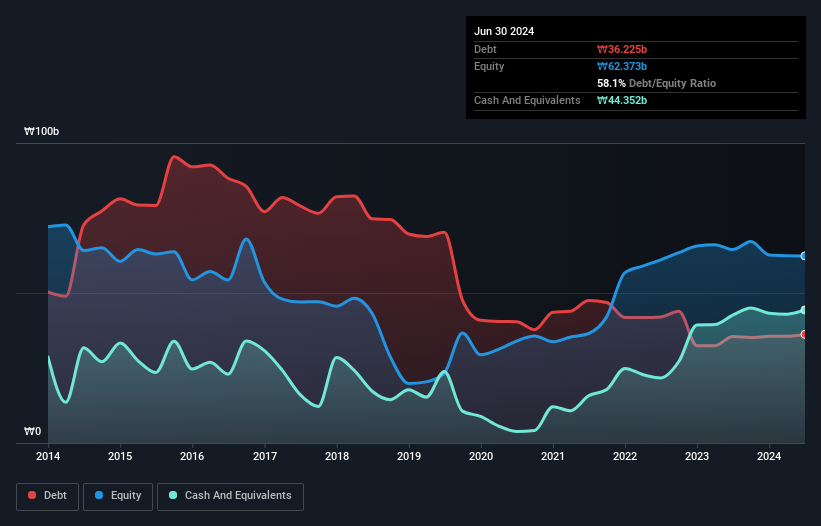Howard Marks put it nicely when he said that, rather than worrying about share price volatility, 'The possibility of permanent loss is the risk I worry about... and every practical investor I know worries about.' When we think about how risky a company is, we always like to look at its use of debt, since debt overload can lead to ruin. As with many other companies SANGBO Corp. (KOSDAQ:027580) makes use of debt. But the more important question is: how much risk is that debt creating?
When Is Debt Dangerous?
Generally speaking, debt only becomes a real problem when a company can't easily pay it off, either by raising capital or with its own cash flow. If things get really bad, the lenders can take control of the business. However, a more usual (but still expensive) situation is where a company must dilute shareholders at a cheap share price simply to get debt under control. Of course, debt can be an important tool in businesses, particularly capital heavy businesses. The first step when considering a company's debt levels is to consider its cash and debt together.
Check out our latest analysis for SANGBO
What Is SANGBO's Net Debt?
As you can see below, SANGBO had ₩36.2b of debt, at June 2024, which is about the same as the year before. You can click the chart for greater detail. But on the other hand it also has ₩44.4b in cash, leading to a ₩8.13b net cash position.

How Healthy Is SANGBO's Balance Sheet?
The latest balance sheet data shows that SANGBO had liabilities of ₩46.6b due within a year, and liabilities of ₩8.14b falling due after that. Offsetting these obligations, it had cash of ₩44.4b as well as receivables valued at ₩18.9b due within 12 months. So it actually has ₩8.51b more liquid assets than total liabilities.
This surplus suggests that SANGBO has a conservative balance sheet, and could probably eliminate its debt without much difficulty. Succinctly put, SANGBO boasts net cash, so it's fair to say it does not have a heavy debt load! When analysing debt levels, the balance sheet is the obvious place to start. But you can't view debt in total isolation; since SANGBO will need earnings to service that debt. So when considering debt, it's definitely worth looking at the earnings trend. Click here for an interactive snapshot.
Over 12 months, SANGBO made a loss at the EBIT level, and saw its revenue drop to ₩61b, which is a fall of 5.7%. That's not what we would hope to see.
So How Risky Is SANGBO?
While SANGBO lost money on an earnings before interest and tax (EBIT) level, it actually generated positive free cash flow ₩3.2b. So taking that on face value, and considering the net cash situation, we don't think that the stock is too risky in the near term. We'll feel more comfortable with the stock once EBIT is positive, given the lacklustre revenue growth. When analysing debt levels, the balance sheet is the obvious place to start. However, not all investment risk resides within the balance sheet - far from it. Case in point: We've spotted 1 warning sign for SANGBO you should be aware of.
At the end of the day, it's often better to focus on companies that are free from net debt. You can access our special list of such companies (all with a track record of profit growth). It's free.
New: Manage All Your Stock Portfolios in One Place
We've created the ultimate portfolio companion for stock investors, and it's free.
• Connect an unlimited number of Portfolios and see your total in one currency
• Be alerted to new Warning Signs or Risks via email or mobile
• Track the Fair Value of your stocks
Have feedback on this article? Concerned about the content? Get in touch with us directly. Alternatively, email editorial-team (at) simplywallst.com.
This article by Simply Wall St is general in nature. We provide commentary based on historical data and analyst forecasts only using an unbiased methodology and our articles are not intended to be financial advice. It does not constitute a recommendation to buy or sell any stock, and does not take account of your objectives, or your financial situation. We aim to bring you long-term focused analysis driven by fundamental data. Note that our analysis may not factor in the latest price-sensitive company announcements or qualitative material. Simply Wall St has no position in any stocks mentioned.
About KOSDAQ:A027580
SANGBO
Manufactures and sells thin films, and nano coating and materials in South Korea and internationally.
Flawless balance sheet with very low risk.
Market Insights
Community Narratives




